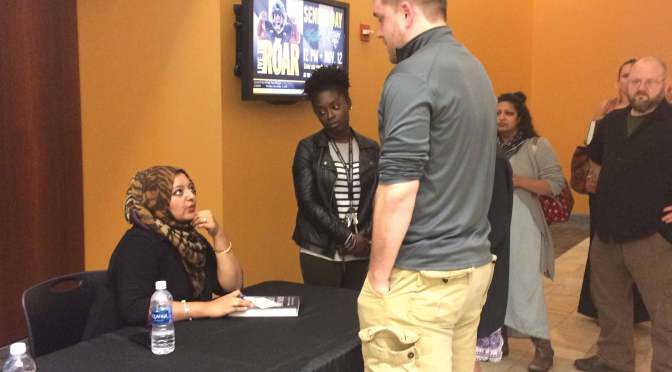
Syed advocate speaks on Muslim media portrayal
By: Marcus Dieterle, Staff Writer
Attorney Rabia Chaudry, a public advocate for Adnan Syed, the focus of the “Serial” podcast, railed against the criminal justice system’s wrongful conviction rate and common media portrayals of Muslims Thursday night, during a discussion of advocacy and social media in the Center for the Arts.
“The initial coverage of media comes from the state narrative,” she said. “We’re not challenging them because the media isn’t challenging them. We’re just told.”
Chaudry, who argues that Syed was wrongfully convicted of the murder of his ex-girlfriend, Hae Min Lee, served as the impetus behind the first season of Sarah Koenig’s podcast, “Serial,” which analyzed Syed’s case. Syed, who was convicted of first degree murder in 2000, was granted a retrial in June.
Founder of the Safe Nation Collaborative, a countering violent extremism (CVE) training firm, Chaudry said media bias against the Muslim community played a role in Syed’s original conviction. She cited a memo from The Enehey Group, whom the prosecution consulted for Syed’s trial. The memo reported on so-called Islamic ideals that the prosecution used to establish Syed’s background and supposed motive for killing Lee.
Chaudry noted how the prosecution used a scarf that Syed bought for Lee as a gift to claim that he was marking “his territory” and that he killed her after they broke up as a way of defending “his honor.”
She said stereotypes like these are not just false, but they’re dangerous for the Muslim community. Islamophobia has escalated since 9/11, but Chaudry said she has long been isolated for being a Muslim American.
Born in Pakistan and raised in small town America, Chaudry remembers not feeling comfortable enough to bring her usual lunch—leftover curry on sandwich bread—to school because it was considered “weird.” Instead, she ate alone at home after school while watching Oprah.
As a Jennings Randolph Senior Fellow at the U.S. Institute of Peace, Chaudry researches the intersection of religion and violent extremism. She said she has constantly been pressed to choose between being an American first or a Muslim first. For her, both are equally important parts of her identity.
She said 80 percent of media coverage referring to Muslims/Islam is related to terrorism. That overwhelmingly negative perception of Muslims has made older generations wary of Syed bringing shame, or worse, to the Muslim community.
But Chaudry said she is seeing a change with younger generations. She said young Muslims have come up to her and thanked her for “talking about [Syed] as a human being.”
Programs like “Serial” and Netflix documentary series “Making a Murderer” have breathed life into old cases and led to investigations into possible wrongful convictions.
“The kind of public awareness and scrutiny that can come from something like ‘Serial’ or ‘Making a Murderer,’ it has profound impacts on actual cases,” she said.
Still, Chaudry believes that the only way to create real, constructive change is through ongoing advocacy and holding public officials accountable.
Junior criminal justice major Jenyce Baytops and Elizabeth Casillas, a forensic science major, said they listened to “Serial” as part of their criminal investigation class.
“I think it’s just sad that so many people are wrongfully convicted … That’s time you can’t get back. If you have family and kids, you’re missing them growing up,” Baytops said.
Casillas said that she hopes to verify that all evidence is tested thoroughly so that incomplete or improper testing does not result in wrongful convictions.
“If I can do that through science, that’s my way of making a contribution,” she said.
In order to mend injustices, Chaudry said people must first acknowledge their biases and be open to conversation.
“We have to find more creative ways of showing people ‘the other’ rather than telling them,” Chaudry said.

